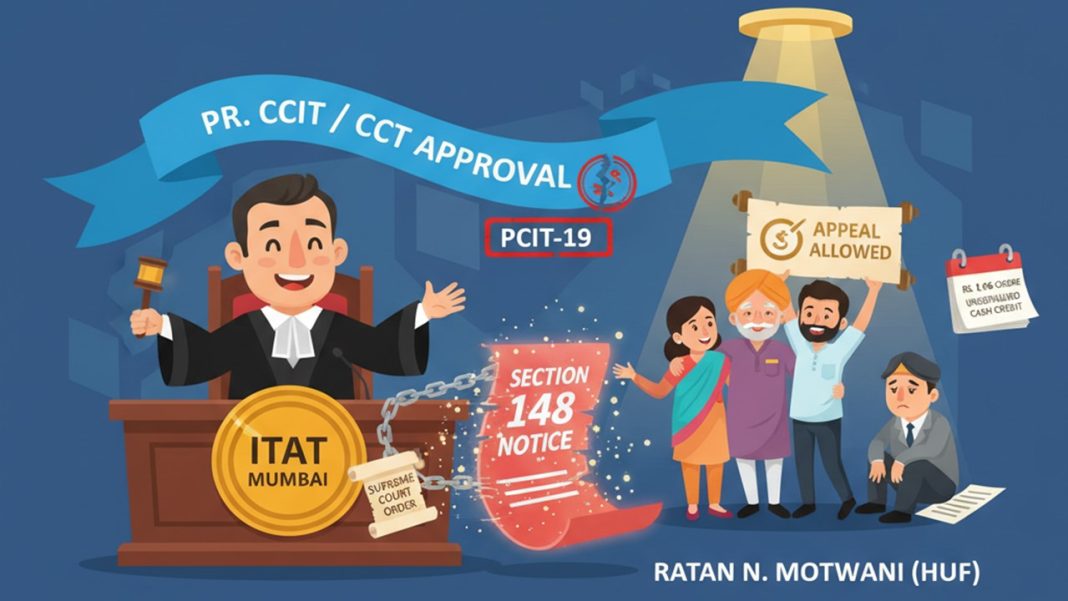ITAT Mumbai Quashes Section 148 Notice, Allows HUF Taxpayer’s Appeal for AY 2017-18
In a recent case heard by ITAT Mumbai, the Tribunal allowed the appeal of a taxpayer HUF related to the Assessment Year (AY) 2017-18, and set aside the Section 148 notice as it lacked approval from the correct authority (Pr. CCIT/CCIT, in this case) under the amended rules, making the reopening of the case invalid.
The appeal had been filed by a taxpayer named Ratan N. Motwani (HUF) in the ITAT Mumbai against the Income Tax Officer (ITO). In appeal, the assessee HUF challenged an order dated August 29, 2025, passed by NFAC, Delhi [CIT(A)], for the assessment year 2017-18.
The assessee HUF filed its income tax return (ITR) for the assessment year 2017-18, declaring a total income of Rs. 402,660. The Assessing Officer (AO) received information from the Investigation Wing that the assessee had taken accommodation entries of Rs. 1.06 crore from a company named M/s. Abhinandan Diamond Private Limited. The information was uncovered during a search conducted under Section 132 of the Income Tax Act in the case of Shri Deepak Jain. In conclusion, the department issued a notice dated June 24, 2021, under Section 148.
Following an order of the Supreme Court in the case of UOI vs. Ashish Agarwal, the Assessing Officer complied with the required procedure and issued an order dated July 27, 2022, under Section 148A(d), confirming the approval from the PCIT-19, Mumbai. A fresh notice under Section 148 was issued, and the assessment under Section 147 was completed.
During the course of reassessment, the AO made an addition of Rs. 51,90,400 and Rs. 51,89,440 to the income of the assessee as bogus sales shown to two companies, i.e., Abhinandan Diamond Pvt. Ltd. and Aisshpra Gems Gravit Diamonds Pvt. Ltd. Further made an addition of Rs. 22,00,000 under Section 68, treating a loan repayment as unexplained cash credit because the assessee did not submit confirmation. Basically, the assessing officer (AO) treated all these three amounts as unexplained, as no proofs were submitted.
The aggrieved assessee thereafter filed an appeal before the CIT(A). The authority dismissed the assessee’s appeal through an order dated August 29, 2025. Thereafter, he filed an appeal before the Tribunal. The assessee raised a total of eight grounds in his appeal. Besides challenging the order of CIT(A), he further challenged legal grounds, including improper approval, incorrect jurisdiction and also the issue of notice beyond limitation.
When the tribunal heard the arguments of both sides and analysed the case deeply, it noted that the amended rules for reopening assessments apply to notices issued after 31.03.2021.
In this case, the first notice was issued on June 24, 2021, and the order under section 148A(d) was passed on July 27, 2025. Since more than three years have passed since the end of the assessment year 2017-18, the law says that only the Pr. CCIT/CCIT (not the Pr. CIT) can approve such a notice.
Here, the notice was issued without approval from the correct authority. Therefore, the notice under section 148 is invalid and quashed. Other issues in the case do not need to be considered. Meaning, the appeal of the assessee has been allowed.
Citation: Ratan N. Motwani (HUF) Vs ITO (ITAT Mumbai); ITA No.5532/MUM/2025; 17/11/2025; 2017-18



